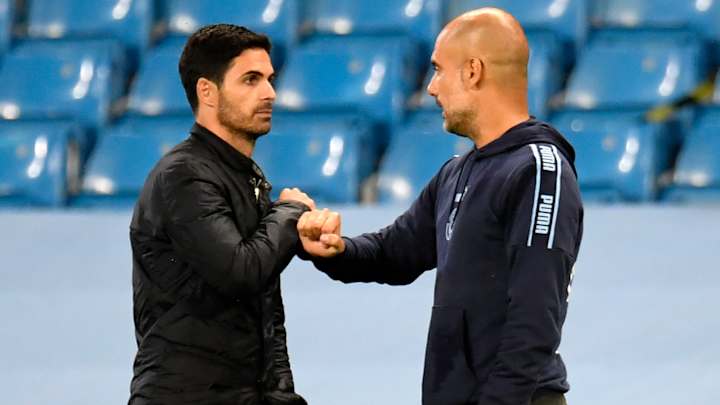Mikel Arteta, Pep Guardiola and When the Gap Closes Between Student and Teacher

On the one hand, there's the genius with two Champions League crowns and eight league titles to his name. On the other, there's his former assistant, just 10 months into his managerial career but already making a positive impression, already with an FA Cup title to his name. Saturday’s meeting of Manchester City and Arsenal is Pep Guardiola and Mikel Arteta's third duel as managers, but it is the first when the question of whether the pupil might soon overtake the master is beginning–quietly, for now–to be asked.
When Arteta took charge of Arsenal, the club was locked in a downward spiral. Arsene Wenger had lingered too long, the squad had become unbalanced, there was a sense of indulgence about various players and fans were in open revolt. Wenger’s departure left a power vacuum, the repercussions of which continue to be felt as the endless backroom wrangling goes on. However much Arteta may have turned things around on the pitch, those battles, and the influence of one agent in particular, should concern Arsenal fans.
But Arteta has turned things around on the pitch. He has an energy and an intensity about him. Arsenal is a far better organized side than it’s been for at least a decade. The number of pressing actions has dipped since the departure of Unai Emery, but its players have become more effective, better targeted and better executed. They pass out from the back with a sense of purpose; it may look risky–it may be risky–but again and again, especially against better sides, Arsenal has drawn opponents forward and then exposed them with a sudden flurry of two or three precise forward passes. That’s how it beat Man City in the FA Cup semifinals last season.
Slowly, the squad is being refined. As Matteo Guendouzi discovered upon his loan to Hertha Berlin, there is no place in Arteta’s setup for those who step out of line. Arsenal has radically improved. It is a team on the up. A year ago, there was a thought that Arsenal might get dragged into a relegation scrap; now it looks like a team capable of finishing in the top four.
City, meanwhile, has been at the top for some time. That doubts are being expressed at all is really testament to just how good it has been. But its points tallies over the past three seasons have gone from 100 to 98 to 81. The drop-off last season can be explained by numerous factors–the failure to replace Vincent Kompany, other defensive issues, Aymeric Laporte’s injury, a natural loss of focus after two such stellar seasons exacerbated by Liverpool’s early-season relentlessness–but there's genuine cause for worry over how many of those same flaws have already been evident this season.
It’s true the fixture list has not been kind. Construct a player to expose City’s weaknesses and you would come up with Jamie Vardy; there’s a reason he is the only player to have scored two hat tricks against Guardiola-coached sides. Marcelo Bielsa holds a particular fascination for Guardiola, and City’s draw against Leeds was an extraordinarily high-quality game of football. Both Sergio Aguero and Gabriel Jesus have been absent, and it may be that new center back signing Ruben Dias finally answers a lot of issues at the back. But City remains vulnerable to balls played in behind the defensive line, something that is happening more and more, seemingly because its press is not so effective as it once was.
That’s what makes Guardiola’s strangely irritated comments after the 5-2 defeat to Leicester, accusing his opponent of not trying to play football, so striking. He sounded, oddly, a lot like late-period Wenger. It was hard to avoid a similar reaction: rather than casting moral judgements of the approach of the other team, maybe he’d be better off sorting out his pressing. At 49, Guardiola is still young for a manager, although he is older now than his great mentor, Johan Cruyff, was when he coached his last game. But he has been a manager for 12 years now, and a decade at the top is a long time. This is the first time he has ever begun a fifth season at a club. Given his intensity, some measure of fatigue is understandable–and it would be no surprise if his players, familiar with his methods, are beginning to chafe at his ferocity.
But there’s also the issue of his pressing, the sense that the game has moved on, and in terms of regaining possession, of setting and springing the trap, he is no longer quite in the vanguard. And that’s what makes Saturday’s meeting so fascinating.
Could it be that, as far as pressing goes, his protégé has now outstripped him?

An accomplished author of multiple books, Jonathan Wilson is one of the world’s preeminent minds on soccer tactics and history.